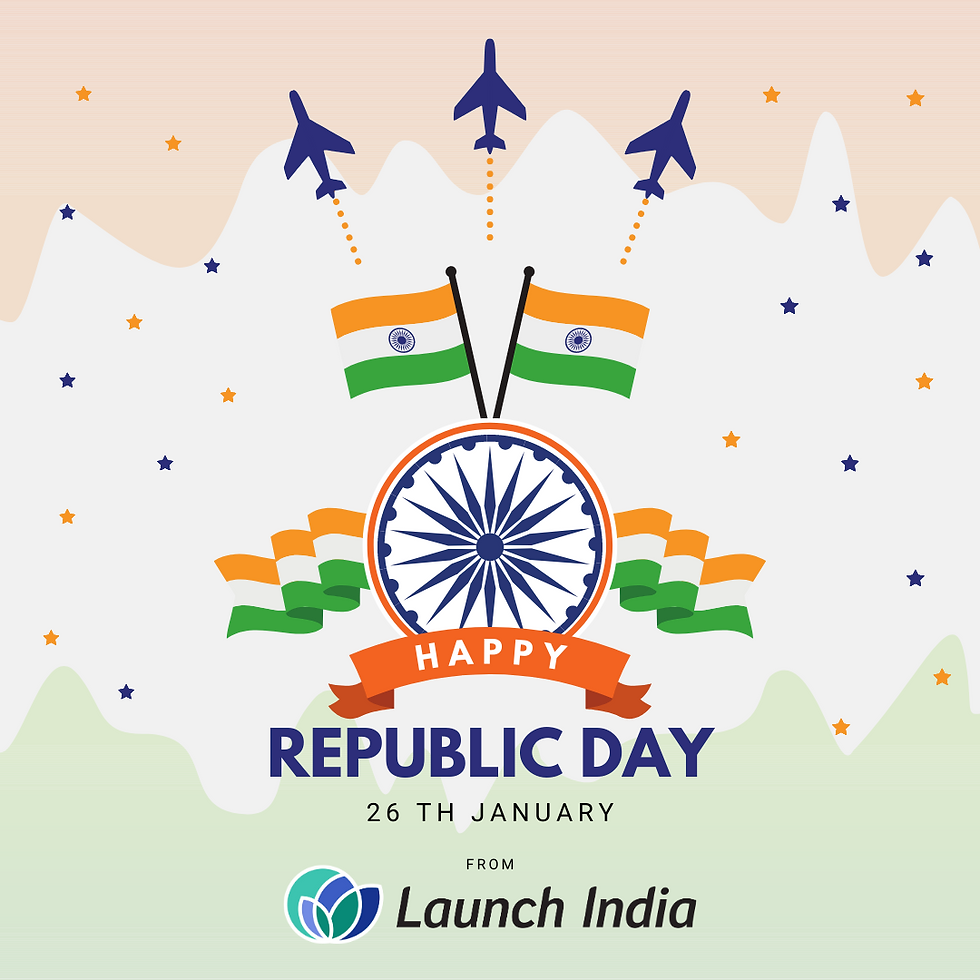Celebrate Indian Republic Day using GPA in Hindi Urdu
- Mary
- Jan 23, 2023
- 4 min read
Updated: Jan 24, 2023
January 26th is one of India's National Holidays- Republic Day! On this day in 1950, the Constitution of India came into effect making India a Republic separate from the British Raj.

Republic Day in Every Phase
Even though Launch India and businesses all across India are closed in honor of the holiday, there is much rich history, culture, and language to explore around this topic. The Growing Participator Approach (GPA) used at Launch India for learning Hindi, Urdu and Punjabi gives rich activities for topics like this holiday across each Phase. Check out the resources below and try them out in your own language sessions in honor of Republic Day this year!
Phase 1- Learn 1000+ words in the national languages of India.
Phase 2- Use a wordless picture book to build a story with your Nurturer centered around the main events of Republic Day.
Phase 3- Check out a recording about the history of Republic Day in India as well as the common traditions for celebrating this holiday made by one of Launch India's own Nurturers in our digital resource library available to students actively taking language sessions. (Phase 3C>> Hindustani Customs and Culture>>Republic Day- Ghazala).
Phase 4- Ask your Nurturer in a Life Story Interview if they did anything special in their childhood or school days to celebrate Republic Day.
Phase 5- Clarify a Native to Native recording about Republic Day or topics related to the history of this holiday. Some resources we recommend include a summary of the holiday in Hindi and a full Republic Day parade in a mix of Hindi and English. Videos on social issues related to the topic can also be insightful to understanding the worldview and varied perspectives of your Nurturers.
Phase 6- Get out in the streets, listen to what people are saying on the topic and participate in the discourse!
How do you know which Phase activities are right for you?
The Growing Participator Approach is designed using best practices for language learning that are effective and fun. While there are a recommended number of hours to be spent in each Phase that can help serve as indicators for when it is time to move on to the next phase, there are other informal indicators that you are in the right place.
Are you encountering approximately 8-10 new words per hour? Vocabulary is a huge component of every language and this is a healthy growth rate that will keep your vocabulary growing in a way that facilitates increased participation in another langua-culture community. "New words" can also include words that are low in your "iceberg" and need strengthening during a lesson. It is very normal to need to ask about a word multiple times across varied contexts before it becomes a word that you easily recognize in any context and can use easily in your own speech.
Are the activities in your phase challenging? Besides the number of new or review words coming from an activity, it is helpful to consider how long it takes you to clarify a recording. One minute of audio should only last 30 minutes maximum of a class. This is an appropriate amount of challenge that will keep you exposed to new language structures and vocabulary. Stopping a recording after each sentence and repeating what was said can also present an extra challenge and help reduce the gap between what we understand and what we are able to speak.
Are the activities in your phase fun? "Fun" in language learning tends to be subjective based on the preferences of each individual learner. But in general, if you are trying to learn from a constant state of overwhelm or stress, your brain will be unable to intake the new information in a way that is healthy for your growth. On the other hand, if you are bored in an activity because it isn't challenging or the content isn't of interest to you, you naturally will not be as engaged or bring as much energy to your own learning. Find activities that interest you and also be willing to humble yourself to be childlike again and open to finding fun in silly things like wordless picture books, silent cartoons, and Phase 1 games.
Should I take a formal assessment? In general, it is believed in the GPA that a formal assessment does little to help promote the kind of langua-cultural growth that we want to see in participants. Often students will spend so much energy stressing about a formal assessment that they cancel language sessions to "study" and develop a performance mindset instead of a humble, growth mindset. There certainly can be benefits from taking a formal assessment as it can provide insight into areas of weakness in your understanding or speech that you maybe hadn't previously known were there. However, we recommend checking out the benchmarks that should be seen in each phase and inviting a certified Launch India language learning encourager to informally observe your session and help you determine when it is time to move on to the next phase. Similarly, we have developed more informal assessments for Phases 1-3 if you want something in between a formal assessment and a self assessment.
Can I use activities from earlier Phases?
Absolutely! We highly recommend supplementing your language sessions with activities from earlier phases. This can be used as a "hole-finding" activity that helps you see where you lack the vocabulary needed to describe a wordless picture book from Phase 2 or retell a story from a Phase 3 recording. It can also provide a welcome change of pace during a language session to keep things challenging and fun.




Comments